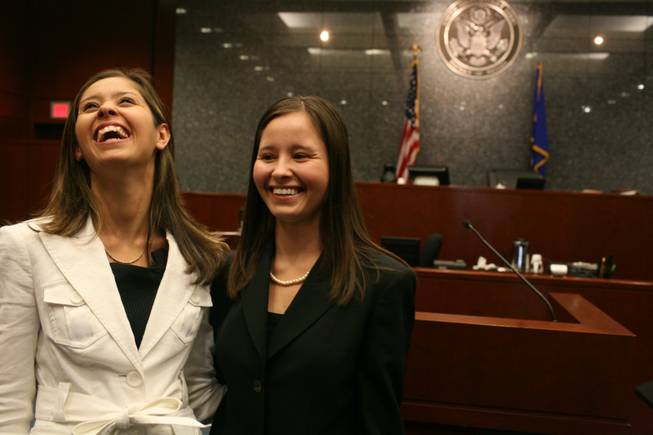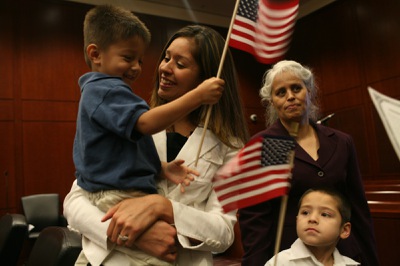
Maria Elizabeth Parra-Hernandez, left, celebrates her citizenship July 25 with her sister, Maria Luisa Parra-Sandoval, at the federal courthouse. They crossed the border with their mother as youngsters.
Sunday, Aug. 3, 2008 | 2 a.m.

Maria Elizabeth Parra-Hernandez, 25, is a juvenile services assistant for Clark County, helping youths who have broken the law meet the terms of their probation. Her 3-year-old son, Julian, her mother, Eva Parra, and her 5-year-old brother, Angel Parra-Sandoval, joined her at her naturalization ceremony July 25 at the federal courthouse.
The Diamonds or Pearls Question
In Today's Sun
Their father works at the Luxor, in the kitchen, their mother at a laundry cleaning hotel linens. Neither parent had more than a grade school education.
Yet in May, carried by their dreams and ambitions, Maria Elizabeth Parra-Hernandez and Maria Luisa Parra-Sandoval became the first members of their family to finish college.
Back in Mexico, where the sisters were born, their grandparents listened over the phone, elated, as the siblings’ names were called at commencement.
The journey to graduation was a long one.
The sisters spent the early years of their childhood in Ixtlan del Rio, about 60 miles from Puerto Vallarta, in a brick house down the street from shanties constructed of cardboard and aluminum scraps.
In the first days after they slipped into the United States, the sisters knew no English.
For years, they slept in the living room of their family’s one-bedroom apartment at Eastern and Sunrise avenues. They spent afternoons at home, studying, out of reach of neighborhood drug dealers and away from the streets they walked on the way to school.
“I am lucky,” Parra-Sandoval says often of opportunities she’s had.
But her story, and her sister’s, are less about luck than about how hard work and determination can work tiny miracles.
Miracles because, in many ways, Parra-Hernandez and Parra-Sandoval have defied the odds.
At the siblings’ alma mater, Valley High School, less than half the students graduate. Nationwide, among 25- to 29-year-olds, Hispanics are less likely than non-Hispanic whites, blacks and Asians to hold bachelor’s degrees.
Having bucked the trends, the sisters are leading lives markedly different from their parents’. Parra-Hernandez, 25, a juvenile services assistant for Clark County, helps youths who have broken the law meet the terms of their probation. Parra-Sandoval, 23, is preparing for law school.
“(Our parents) always had to do manual stuff with their hands, and they’re proud that we’re actually getting jobs and it’s with our heads, basically,” Parra-Hernandez said. “I feel that for me, it’s a gift for our parents for us to finish college, so they don’t see us working like they did.”
The sisters are passing along the message that education matters to their brothers, 22 and 5. The older one is studying at the College of Southern Nevada. And will the young one go to college?
“He has to,” Parra-Sandoval said, laughing. “He doesn’t get a choice.”
• • •
You might remember Parra-Sandoval as the young woman who posed the final question at November’s Democratic presidential debate at UNLV.
Wearing a dark blazer, her coffee-colored hair falling just below her shoulders, she asked Hillary Clinton whether she preferred diamonds or pearls.
The audience laughed. Later, a fellow student confronted Parra-Sandoval: “You gave our university a bad reputation.”
Swamped by ridicule, she remained self-assured, explaining that she had prepared other, more serious questions, but that CNN, the debate’s sponsor, had requested she ask the fun one.
Then she turned to more pressing matters. As she later told UNLV Magazine: “This happened on a Thursday, and I had an exam on Monday for an honors literature class on Western civilization. I had all these calls from the media. I decided I wasn’t going to ruin my GPA for that. I turned my phone off, and I got an A.”
That studying took priority would not have surprised those who knew Parra-Sandoval well. Her devotion to school had long been intense.
Parra-Hernandez laughs as she recounts how, back at that apartment at Eastern and Sunrise, her sister used to shut herself in the bathroom to study, saying noise made it impossible to focus elsewhere at home.
The quiet confidence with which Parra-Sandoval approached the CNN uproar was also typical of her character.
Years before, that poise had caught the attention of Larry Letourneau, director of research and compliance for UNLV’s Center for Academic Enrichment and Outreach. At the time, he was an academic adviser for its Educational Talent Search, a college preparation program in which Parra-Hernandez was enrolled.
After Letourneau presented the program to Parra-Sandoval’s middle school class, the girl walked up to him to say hello, unusual considering how shy many children are, Letourneau said: “She introduced herself to me and she said, ‘I’m Maria Luisa. You might know my sister, Maria Elizabeth.’ ”
• • •
“Their mentality does not include limitations, so therefore they’re not afraid to aspire to do anything,” the sisters’ godmother, Mary Elizabeth Martinez, said. Martinez was Parra-Sandoval’s second grade teacher at Sunrise Acres Elementary School, so she knows how far Parra-Sandoval has come.
The student studying for the Law School Admission Test knew no English when she arrived in the United States more than 15 years ago. She had crossed the border with her mother and siblings, guided by smugglers, to join her father in Las Vegas.
At school, a young Parra-Sandoval fretted that she wouldn’t be able to talk to her teacher.
“She was pretty relieved when she found out she could actually communicate with me and wouldn’t be left out,” Martinez remembers. “I met her at the front door of my classroom at Sunrise Acres. She was just so pie-faced, a moon-faced little girl, white skin and long brown hair, and just as innocent and trusting as they get.”
The opportunities that presented themselves to Parra-Hernandez and Parra-Sandoval in later years were nothing out of the ordinary. The reason the siblings succeeded was that they took advantage of what came their way.
Both stayed in Talent Search through middle and high school, going on field trips to local colleges, picking up study skills and learning about financial aid.
In high school, they got good enough grades to land the state’s Millennium Scholarship, which provides $10,000 for college.
A few years ago, Parra-Sandoval got an e-mail from a woman she had met at a Hispanic leadership conference, sharing information on a Harvard public policy and leadership conference. Other people might have hit “delete,” but Parra-Sandoval applied and found herself at Harvard in 2005.
The following spring, she served as a press office intern for Sen. Harry Reid in Washington after hearing of the position through a routine announcement a professor had made in class.
• • •
On July 25, after years of waiting, Parra-Hernandez realized yet another of her long-standing dreams: becoming a citizen. One of two volunteers to speak during the naturalization ceremony, she chose education as her theme.
While still at UNLV, Parra-Hernandez had married and had a son, which only strengthened her desire to complete her degree in human services counseling.
“I want him to be proud of me when he’s older,” she said. “I want him to see that Mom finished college and Dad finished college, and I expect him to go to college.”
Taking the microphone at the July ceremony, Parra-Hernandez thanked her parents and talked about the life they gave her by bringing her to the United States.
Watching her standing behind the podium, holding forth to a crowd of more than 100 people, it was hard to imagine she was once a little girl, crying, a pillow over her head, frustrated because her English was so poor she couldn’t understand her homework.
And though she and her sister have refused to allow their modest beginnings to limit what they achieved, they have always remembered their roots.
Parra-Hernandez said living in Ixtlan del Rio not far from those shanties taught her to appreciate what she had: “You don’t need anything big or fancy to be happy because at the end all you have is your family, and that’s what should be most important.”
Parra-Sandoval said in their old hometown in Mexico, people were always willing to help one another. Maybe that’s one reason she is intent on using her knowledge to better the lives of others.
Her struggle to secure citizenship — she was naturalized in 2006 — helped spark her interest in studying law.
“There was a lot of paperwork that needed to get done since I was really young, and we never had a lawyer,” said Parra-Sandoval, who studied political science at UNLV.
“It made me want to help people who were in the same shoes.”
She will spend the next year working for Clark County Legal Services, helping to persuade attorneys to take pro bono cases.
Then she hopes to enroll in an East Coast school that offers a joint-degree program in law and public policy.
So after all these years, the girl from Ixtlan del Rio is still dreaming. And with her 3.94 college grade point average and record of achievement, it’s not a stretch to think we might find her at Harvard or Princeton next fall.
And for those who wonder how she found success, she offered these parting thoughts at the end of a long interview: “If you want something, you’ve got to earn it.”

Join the Discussion:
Check this out for a full explanation of our conversion to the LiveFyre commenting system and instructions on how to sign up for an account.
Full comments policy